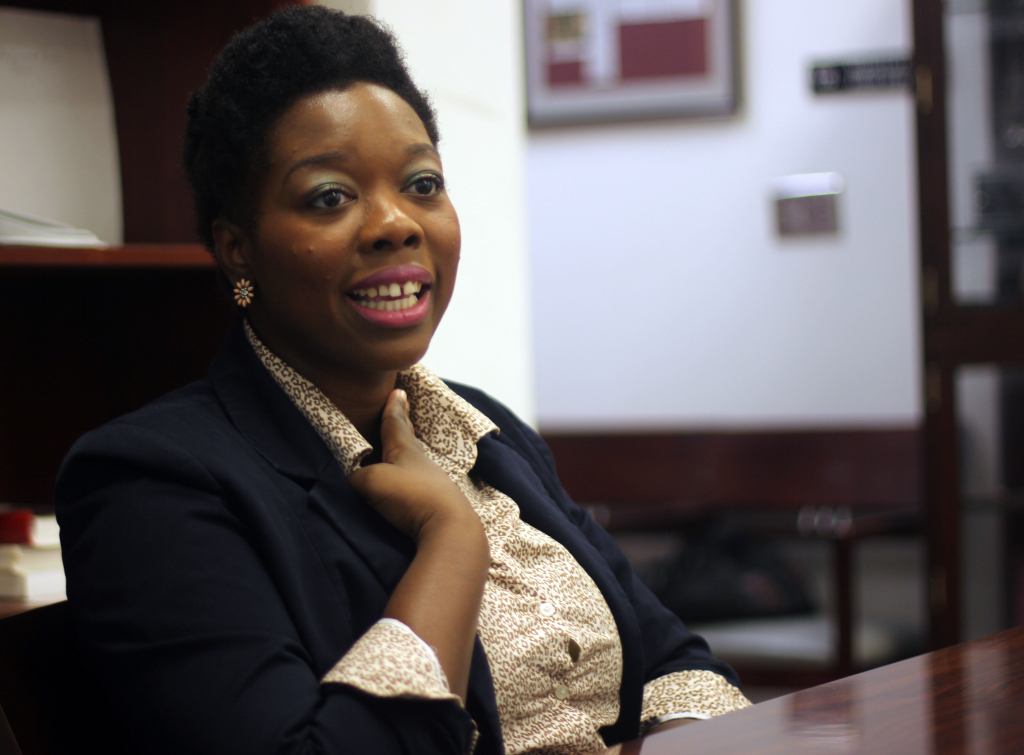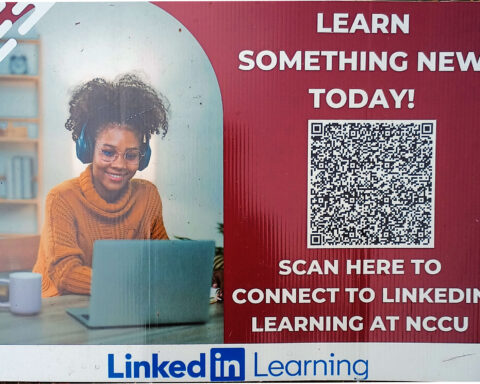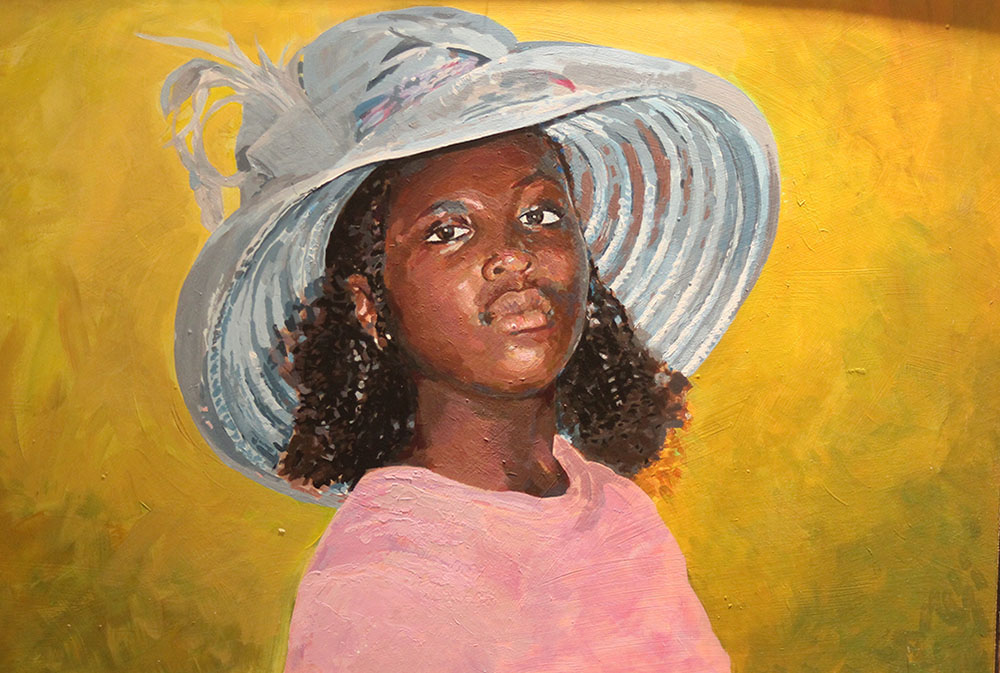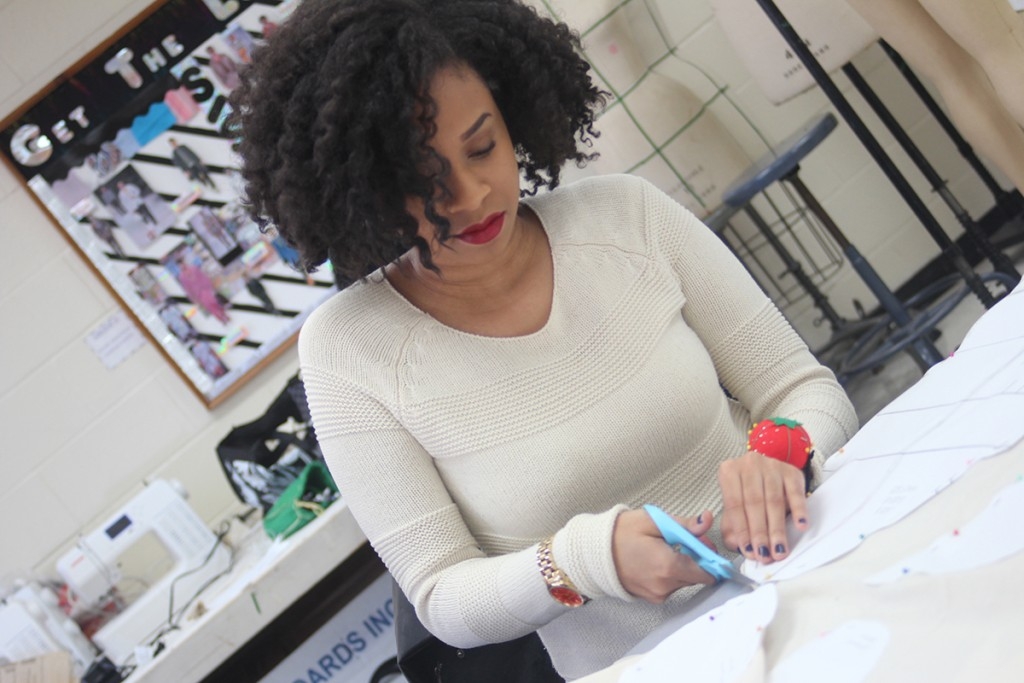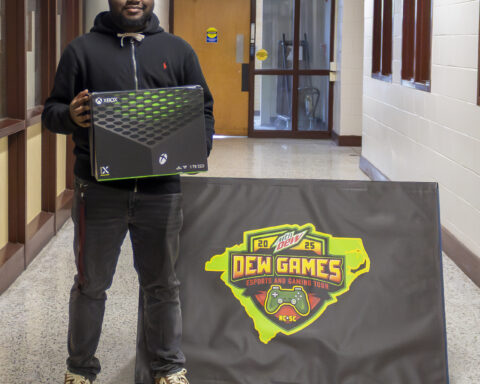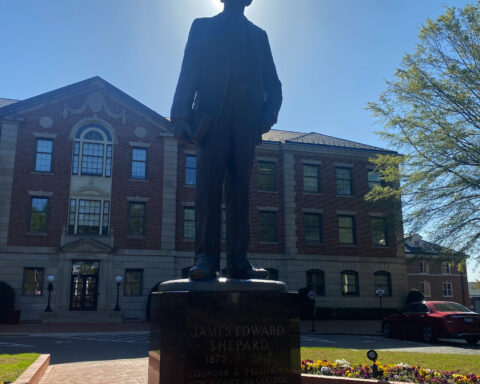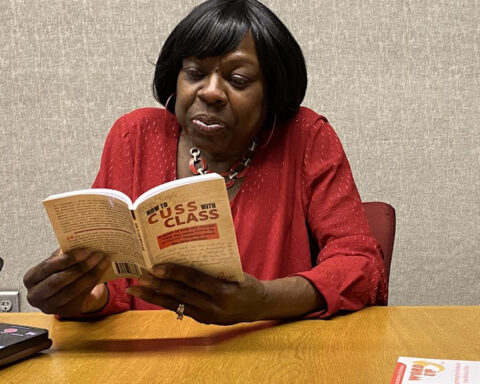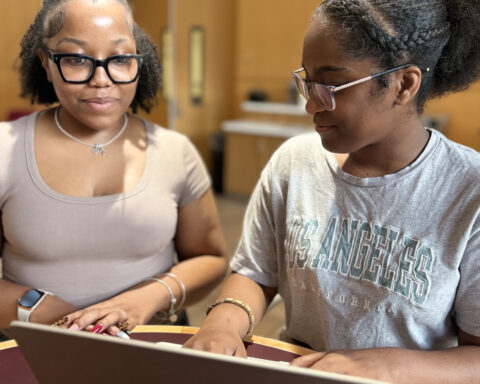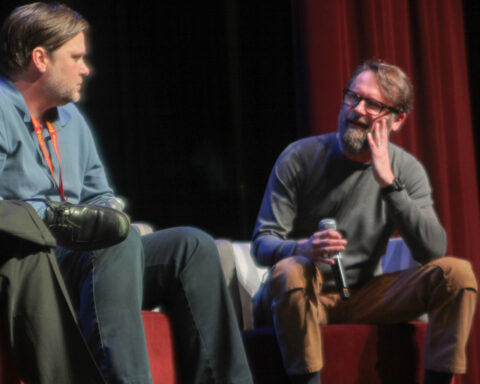After being diagnosed in November 2014 with Dermatofibrosarcoma Protuberans, a rare and sometimes fatal skin cancer, N.C. Central University graduate student Dominique Hardy kept her faith and didn’t let her DFSP diagnosis discourage her.
“I’m privileged to be here ,” said Hardy.
Now, having beat the odds of the cancer, Hardy is pursuing a public adminstration master’s degree with plans of becoming a dual law student.
Hardy was born and raised in Dublin, Ga. where she earned a degree in liberal studies from Armstrong Atlantic State University. At AASU she was president of the campus branch of the National Association for the Advancement of Colored People.
The cancer first appeared when Hardy was 9 years old, but remained undiagnosed for 15 years.
“When I was a little girl, there was a spot on my back that appeared as the size of a pinhead,” said Hardy. “As I grew it began to grow.”
Hardy said the spot eventually began to look like a sunken hole, which prompted her mother to take her to the doctor.
“At nine years old, the doctor told me I had lupus,” said Hardy, referring to the first of several misdiagnoses. Lupus is an inflammatory disease caused when the immune system attacks its own tissues. There are 200,000 to 3 million lupus cases in the United States each year.
Hardy returned to the doctor a year later. “All the blood work came back and the doctors told me it [the lupus diagnosis] was a false positive,” said Hardy.
Hardy would live uneventfully with the mysterious spot for 15 more years. She would visit numerous doctors. They would ask whether she had fallen. Or if she someone had hit her.
A turn for the worse
But during her first year at NCCU’s law school things took a turn for the worse. Hardy said she began to “feel nauseated and sick,” not realizing that these symptoms were related to the spot on her back. Hardy said she always felt “uneasy and unwell,” and thought she was simply stressed out from the workload at law school.
Once again she started visiting doctors one of whom sent her to a dermatologist.
“The dermatologist told me that there was no need for a biopsy, and that my scar was dead,” said Hardy.
But seven months later the spot had doubled. It began to protrude out of her shirt. She returned to the dermatologist. This time he seemed alarmed and decided to perform a biopsy.
A few weeks later the results came in. The doctor would not give the diagnosis over the phone, and she sensed that she had something to worry about. When she arrived in his office his body language and facial expression told her he was about to bear some really bad news. It was cancer, an uncontrolled division of abnormal cells.
“The doctor told me I was diagnosed with a rare form of skin cancer,” said Hardy. “He said he has only seen two cases like this in his whole career.”
Hardy laughed in disbelief of her diagnosis of an extremely rare cancer called DFSP, which affects about 1-5 people per million. DFSP is a soft tissue sarcoma that develops in the deep layers of skin. It affects blacks twice as much as whites.
After receiving the news, she said her mind went blank.
“My first question was: ‘Has it spread?’” said Hardy. After a bit of research her doctor told her that DFSP typically spreads to the lungs.
Hardy knew her condition was serious when an employee from a cancer center came to talk to her. “That is when I had my first meltdown,” said Hardy.
Hardy walked out of the hospital in shock. After she left she tried to call the two people who were the closest to her, but no one answered.
“I called the individual I was living with and asked her to meet me at home,” said Hardy.
Hardy said the hardest thing she had to do was tell her mother. She said it took her two weeks.
“I am the fourth out of five kids,” said Hardy. “I just couldn’t find a way to tell her.”
After Hardy discussed her diagnosis with her family and friends she was on a mission to get a CAT scan to determine if her cancer had spread.
“I know I needed a CAT scan when the dermatologist was telling me about where it could spread,” said Hardy.
She said none of the doctors she went to would give her a CAT scan because “it was out of protocol.”
Hardy said she knew she did not have much time because if her scar had grown over 50 percent in 7 months, she did not know what else it was capable of.
Prayer changes things
One night Hardy said she had a defining moment when she just prayed. “I said God, I’m scared and I have no idea on what I need to be doing right now,” said Hardy. “I felt compelled immediately after I prayed to call another individual.”
Hardy said she called a 60-year-old woman whom she knew was a cancer survivor.
“She told me about the Cancer Treatment Centers of America,” said Hardy.
Cancer Treatment Centers of America was founded in 1988 by Richard J Stephenson. It is a leader in integrative cancer care designed to provide hope and options for cancer patients. There are hospitals in Atlanta, Chicago, Phoenix, and Tulsa.
Hardy called Cancer Centers Treatment of America at Southeastern Regional Medicial Center in Newnan, Georgia the night she found out about them.
“I called and told them I’ve been diagnosed with cancer and I need someone to tell me something,” said Hardy. She said she explained to them that she was having trouble breathing and she needed a CAT scan.
The CTCA employee told her that they were going to take care of her and give Hardy a CAT scan. The only thing she had to do was turn in her paperwork.
“They flew me out and did everything for me,” said Hardy.
According to Hardy, CTCA provided her with compassion, a layout for her cancer, and a team of people that included a nutritionist, oncologist, and chiropractor.
“I didn’t feel like a number or a research project,” said Hardy. “I felt like a person who was empowered by options.”
After Hardy arrived, she received her CAT scan and the doctor told her that her cancer had not spread. “The oncologist told me that my cancer was refusing to move from the area that it was in,” said Hardy.
Hardy knew that her cancer did not respond to chemotherapy and that she would have to go through radiation surgery.
“They used their expertise and compassion to help me feel empowered by my options,” said Hardy. “They developed a plan for me based on my thoughts and their expertise.”
Hardy said that she and her team of doctors decided to go with the surgery on her back and that there was no way they would know if they could get it all. Hardy said if they didn’t get it all that she would have to undergo thirty rounds of radiation, and they would have to remove skin from her thigh to cover the hole on her back.
On November 24, 2014, doctors removed the cancerous tumor from her back, which left a big hole.
“They did their best to give me pain medicine, but it felt like I was laying on a railroad tracks,” said Hardy.
Hardy described her recovery process as intense. “Sometimes in life, recovering is more difficult than what actually happened,” said Hardy.
“I remember one defining moment after my surgery when I realized I couldn’t walk,” said Hardy. “Your stomach and your back is how you do everything and some people don’t think about that.”
Hardy said in the process of her learning how to walk all over again created a meltdown. She said a custodian from CTCA came by and encouraged her to walk and to try again.
“That compassion helps aid people in the healing process,” said Hardy.
In mid-December of 2014, Hardy received her test results: she is cancer-free. She has been in remission for 8 months.
Hardy advises everyone to stay on top of their health.“Know yourself and pay attention to your body,” she said.

